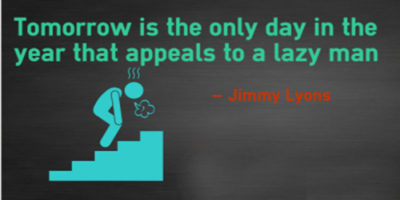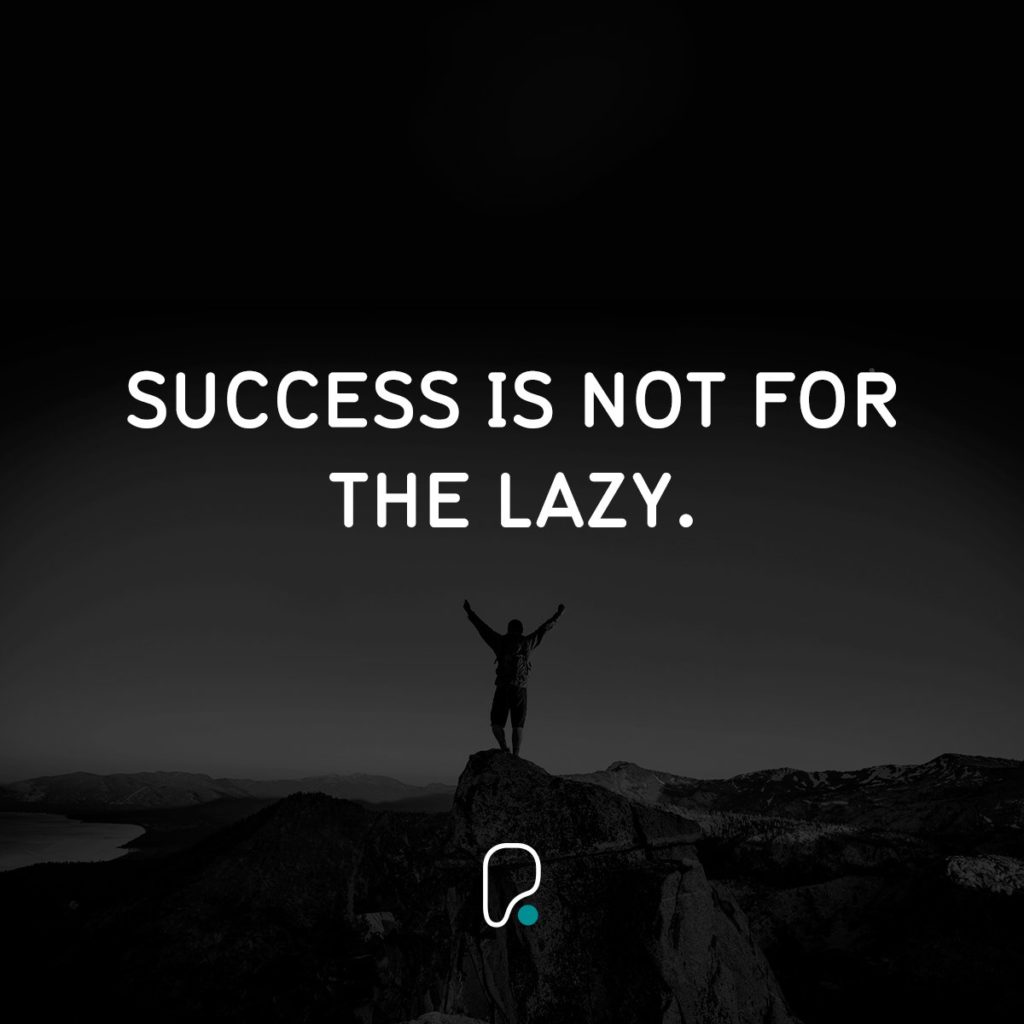
Laziness is a major detriment to our success. It impacts our ability to be productivity and accomplish our goals. There usually complex web of reasons behind our behavior that we need to understand. Learn four steps to find out how you can reach this understanding and what you can do to overcome laziness and be productive. (Estimated reading time: 7 minutes )
“The way to get started is to quit talking and begin doing.”
— Walt Disney
We all have those days when we just can’t motivate yourself to get off the couch (or out of bed). You take a cursory glance at the pile of paperwork on your desk, or the overflowing laundry basket and promise yourself that you’ll eventually get to it, but for now, you’re going to finish up a bag of Doritos and watch Game of Thrones.
Being lazy once in a while can actually be a good thing, especially if you’ve been working hard for long periods of time. But when it becomes an incessant behavioral pattern that reduces your productivity, that’s when you know that you’re in trouble.
Laziness is a state of passivity where we allow things to stay as they are, and we resist trying to change things. In pop culture, this quirk has taken on a comedic, almost endearing quality.
We all love Garfield, the lazy cat who just wants to sleep and eat Lasagna all day. Or Homer Simpson, the ultimate underachiever and immature ‘average Joe’ with strings of short-lived passions. We’ve heard songs like The Lazy Song by Bruno Mars that glorifies the lazy life.

However, when we look at this trait through the lens of reality, we’ll see its detrimental effect on our happiness. This is especially true if you’re someone with ambition who wants to ‘go places’ in life.
Author Jim Rohn once said, “we must all suffer from one of two pains: the pain of discipline or the pain of regret. The difference is discipline weighs ounces while regret weighs tons.” Being productive requires us to apply ourselves and enforce discipline in our life.
Laziness has become more prevalent in our society, especially among the younger generations. The pressures of living in a task-driven culture where achievement is prized can be overwhelming, and can cause us to shut down and live in our own bubbles. It doesn’t help that there are a number of distractions from social media and the Internet that provide escapism.
Breaking the cycle of laziness to increase our productivity requires a lot more than half hearted-promises, reading a list of productivity hacks, or downloading one of the thousands of planning apps available. Similar to procrastination, laziness is a result of a complex web of psychological issues and a lack of essential skills, such as planning and time management.

When we fail to act, nothing moves forward in our lives. As Newton’s first law of motion states, “If nothing happens to an object, and nothing does ever happen, then that object will never go anywhere.” The challenge is finding that spark of inspiration to generate the energy needed to put things into motion. For that to happen, we need to find the right incentive.
The good news is that you don’t have to look far for inspiration. If you have a pet dog or a cat, you’ve probably seen how it instantly wakes up from sleep when it realizes that there are treats or a nice belly rub on offer. We are no different from our furry friends – we too need to find out what our ‘treat’ is that will motivate and get us moving.
The most successful people in the world are incredibly productive and have a solid work ethic that has enabled them to make great strides towards their vision. They’re intuitively aware that laziness is the nemesis to their productivity. Athletes like Serena Williams, business magnates such as Elon Musk, and entertainers such as Steve Harvey have been known for their meticulously planned schedules which they tackle with efficiency and precision.

Of course, we don’t all have to subject ourselves to intensely demanding schedules and drills. We can dial it down and craft a lifestyle that suits our specific goals and unique sensibilities. Here are four steps that can help you overcome lazy tendencies and build momentum:
1. Get clear on what you want to achieve and why it’s important to you: Before embarking on any endeavor it’s essential to get laser focused on what exactly you want to accomplish. Having a clear end goal that creates a fire in your belly will pull you towards it. If you’re frequently caught up in lazy spells, set some time aside to go within and reflect on the person you want to be, and the life you want to live. Your inner compass will show you the way before you make any major decisions.
Here are some questions that you can reflect on: Why is it important that I achieve this? What are the potential outcomes if I succeed and how would that make me feel? What are the consequences of not taking any action?
2. Stop calling yourself lazy and identify the real issue: If you’ve become accustomed to being seen as the lazy one, it’s time to strip off that label. Stop labeling yourself as ‘lazy’ or accepting that reputation from others because the tags that you attach to your identity have a significant impact on your psyche. The way we see ourselves, positive or negative, majorly influences our self-concept and affects the nature of our thoughts and actions. Negative labels such as ‘lazy’ restrict your potential to grow and are often self-fulfilling. Your words and actions will reflect on lazy behavior. Remove this label and replace it with positive ones such as ‘resourceful, hardworking, and smart’.
While making the transition to changing your habits, take the time to dig deeper and find out the underlying cause of your passive behavior. Get to the root of your patterns. Remember that laziness is not a personality trait but a habit which can be changed with conscious effort.
3. Prioritize tasks and plan accordingly: According to the ‘Law of Forced Efficiency’, there is never enough time to do everything, but there is always enough time to do the most important thing. This requires that we prioritize and plan so that we spend time only on the things that matter the most at that particular time, without spreading ourselves too thin. Contrary to what most people think, you don’t need to be ‘switched on’ and in work mode all the time.
You can engage in short sprints of real focused work which last for 30-90 minutes. In between, take breaks to relax and rest your mind. This kind of working pattern ensures that you don’t burn out or suffer mental fatigue.
4. Acknowledge your wins and reward yourself along the way: One of the most rewarding aspects of working hard is when you start seeing signs of success. At these mini-milestones, you will slowly begin to reap the fruits of your labor, and the prize that you’re after will gradually come into view. Acknowledging these small wins along the way is a potent source of motivation that will negate any laziness. I like to note down my successes in my journal and contemplate on my journey while appreciating the work I put in and the support that was offered to me by others.
5. Stay balanced and healthy: It’s tough to stay on top of things if you lack energy. Feeling tired, drained, and unfit will deplete you. Any initiative will feel like an uphill climb. A balanced and healthy lifestyle is imperative if you want to perform at your peak level. This requires that you get the basic tenets of healthy living right: eat healthily, drink enough water, be physically active, get sufficient sleep, and manage your stress levels.
Another practice that’s popular among well-known peak performers such Tony Robbins is following a start-up morning routine that prepares the mind, emotions, and body to bring out it’s best for the rest of the day. These morning routines can include meditation, working out, deep breathing exercises, morning prayers and affirmations, a gratitude practice, and eating a healthy breakfast keep blood sugar levels stable.
Life is like one big vacation, and it’s up to us to map out a master itinerary that excites us. During this vacation, we have the opportunity not only to accomplish the things that are dear to our hearts, but also to leave our footprints on the sands of time through our contributions and efforts.
All my best on your journey,
Seline

Question: Do you find it a challenge to overcome laziness and be productive? What have been your major obstacles?
Did you like this post? Sign up below and I’ll send you more awesome posts like this every week.

Seline….what about when the lazy feeling is due to things you really have no control over- like a medical condition that makes it so you physically can’t do things very much??
I hate feeling and being so lazy but it is hard to do things when you live with chronic back pain from fused vertebrae and osteoarthritis. I’m often called lazy by those who can see my ailment because physically I look fine… and I hate feeling lazy but I just can’t do much.
so how can I change my way of thinking because I hate myself but don’t really see how i can do anything more than what I already am. Any tips you can share?
I am sending this article to a friend of mine! She really needs to hear this and start finding ways to fight her laziness and lack of motivation and get out and enjoy life before it passes her by! So thank you and hopefully, she will listen to you because she has not been listening to me and I am at my wits end trying to help her!
Marissa – she’s lucky to have a friend like you. 🙂